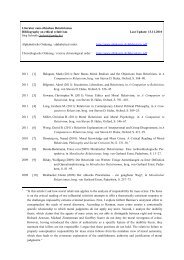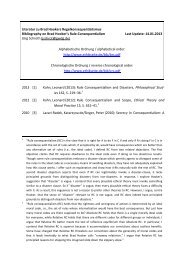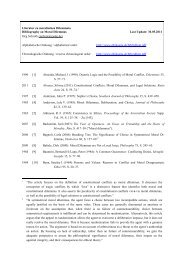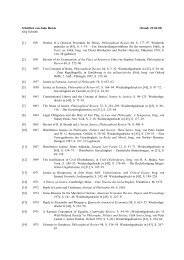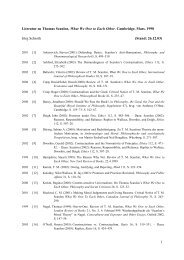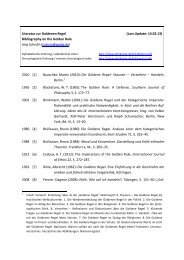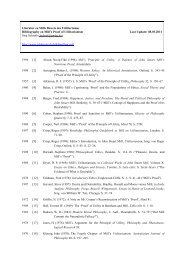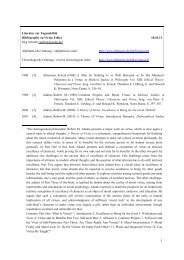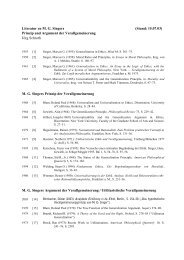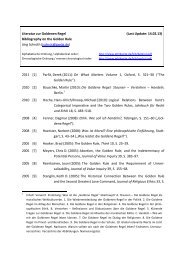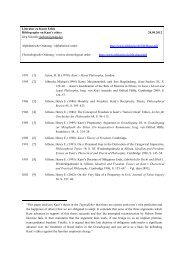Chronologische - Ethikseite
Chronologische - Ethikseite
Chronologische - Ethikseite
You also want an ePaper? Increase the reach of your titles
YUMPU automatically turns print PDFs into web optimized ePapers that Google loves.
2007 [300] Timmermann, Jens (2007): Kant’s Groundwork of the Metaphysics of Morals: A Commentary,<br />
Cambridge.<br />
2007 [301] Weber, Michael (2007): More on the Motive of Duty, Journal of Ethics 11, S. 65–86. 87<br />
2007 [302] Wendel, Hans Jürgen (2007): Vernünftige Selbstbestimmung und gutes Leben, in Was ist und<br />
was sein soll. Natur und Freiheit bei Immanuel Kant, hrsg. von Udo Kern, Berlin, S.<br />
241–64.<br />
2007 [303] Wood, Allen W. (2007): Comments on Guyer, Inquiry 50, S. 465–79. 88 – Zu [271].<br />
2006 [304] Ameriks, Karl (2006): Kant and Motivational Externalism, in Moralische Motivation. Kant<br />
und die Alternativen, hrsg. von Heiner F. Klemme, Manfred Kühn und Dieter<br />
Schönecker, Hamburg, S. 3–22.<br />
2006 [305] Baron, Marcia (2006): Acting from Duty (GMS, 397–401), in Groundwork for the<br />
Metaphysics of Morals, hrsg. von Christoph Horn und Dieter Schönecker, Berlin, S.<br />
72–92.<br />
2006 [306] Baron, Marcia (2006): Moral Paragons and the Metaphysics of Morals, in A Companion to<br />
Kant, hrsg. von Graham Bird, Oxford, S. 335–49.<br />
2006 [307] Baron, Marcia (2006): Overdetermined Actions and Imperfect Duties, in Moralische<br />
The paper also discusses Kant’s attempts to clarify his moral psychology, philosophy of value and<br />
conception of the highest good in the course of replying to Garve’s challenge.”<br />
87 “A number of neo-Kantians have suggested that an act may be morally worthy even if sympathy and similar<br />
emotions are present, so long as they are not what in fact motivates right action-so long as duty, and duty<br />
alone, in fact motivates. Thus, the ideal Kantian moral agent need not be a cold and unfeeling person, as<br />
some critics have suggested. Two objections to this view need to be answered. First, some maintain that<br />
motives cannot be present without in fact motivating. Such non-motivating reasons, it is claimed, are<br />
incoherent. Second, if such motives are not in fact motivating, then nonetheless the moral agent’s<br />
performance of right action will be objectionably cold and unfeeling. While the first objection is not<br />
compelling, since the alternative according to which all motives in fact motivate but differ in strength<br />
suffers from the very same problems attributed to the neo-Kantian view, the second has force, and any<br />
account of moral worth must make room for motives such as sympathy actually motivating right action.”<br />
88 “Paul Guyer’s paper “Naturalistic and Transcendental Moments in Kant’s Moral Philosophy” raises a set of<br />
issues about how Kantian ethics should be understood in relation to present day “philosophical naturalism”<br />
that are very much in need of discussion. The paper itself is challenging, even in some respects iconoclastic,<br />
and provides a highly welcome provocation to raise in new ways some basic questions about what Kantian<br />
ethics is and what it ought to be. Guyer offers us an admirably informed and complex argument, both<br />
historical and philosophical, that tangles with some of the most difficult problems in Kant’s moral<br />
philosophy. It begins with some ambitious and controversial claims about Kant’s moral philosophy prior to<br />
the Groundwork of 1785. It then offers an interpretation, and also a fundamental criticism, of the<br />
Groundwork’s attempt to establish the moral law based on the idea of freedom of the will. And finally, it<br />
raises – and expresses some opinions on – the large and vexed questions of the relationship between<br />
transcendental philosophy and philosophical naturalism, and whether Kantian ethics can be made<br />
consistent with a naturalistic philosophical outlook. In these comments I will have something to say on each<br />
of these three topics, without pretending (any more than Guyer does) to have exhausted what might be said<br />
about them.”



